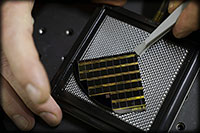SunShot opens round eight of solar incubator funding
 On the heels of former successes, the Department of Energy is launching its eighth round of financing to get solar startups off the ground and running towards commercialization. This time it’s offering up to $12 million to support hardware improvements and the reduction of soft costs—something that has plagued the industry, particulalry in the U.S.
On the heels of former successes, the Department of Energy is launching its eighth round of financing to get solar startups off the ground and running towards commercialization. This time it’s offering up to $12 million to support hardware improvements and the reduction of soft costs—something that has plagued the industry, particulalry in the U.S.
Previous SunShot Incubators have helped create the world’s most efficient PV cells, made by Solar Junction, which are now reaching efficiencies of 44 percent. The cells, intended for concentrating PV rather than flat modules, are expected to start shipping to module manufacturers in the first quarter of 2013—essentially now. Along the way, the multi-junction PV cells have been racking up awards, like the R&D Magazine 2012 R&D 100 Award.
Some other recipients of DOE SunShot Incubator funds are Stion, Alta Devices, Solar Mosaic and Clean Power Finance. Each of which has grabbed headlines overt the past year or two. But they are far from all the companies that have received funding through the program that’s designed to help move the new innovations from the lab and the office to the real world, and to reduce the cost of solar to 6 cents per kilowatt hour.
The DOE launched the current funding opportunity Jan. 16, and it is open to applications through April 30, 2013. Under the current set of offerings, a company could receive up to $4 million in grants. To qualify for that level though, the company must be focussed on hardware and have at least a 50 percent cost share and develop a lab prototype to pilot-scale production. Other awards are available to move hardware designs from the conceptual stage, to the functional prototype stage and from the functional prototype stage to commercially viable prototype.
On the non-hardware side, companies can qualify for up to $2 million to support the transition of a soft-cost reduction solution from alpha capability and early customer trials to full-blown commercialization. However, that also has to be a 50 percent cost share and make the transition from trials to commercialization over 18 months. Earlier stage companies can qualify for up to $500,000 to help them move from proof-of-concept to early trials.
Since its inception the program has helped more than 150 companies move their early stage technologies closer to commercialization. The program and its tier structure are helping move successful applicants across each stage of innovation. And previous winners, like Solar Junction have received numerous awards as they progressed through the stages toward commercialization.



